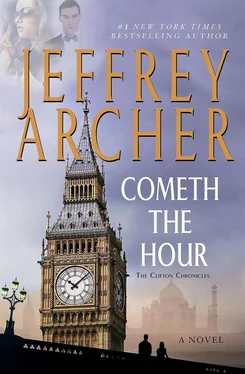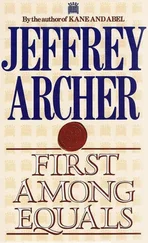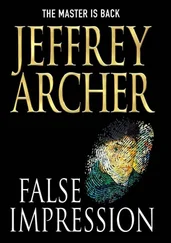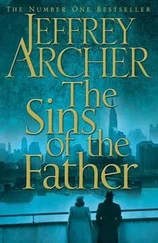“I’m sure Mr. Gibson will be back in a few minutes, Mrs. Clifton.”
“Don’t worry, it’s not important. But would you ask him to drop in and see me when he’s next passing my office?”
“Can I tell him what it’s about?”
Karin looked out of the window at the countryside rushing by as the train continued on its journey to Truro. But her thoughts were elsewhere as she tried to come to terms with the baroness’s death.
She hadn’t been in touch with Cynthia for several months, and MI6 had made no attempt to replace her as Karin’s handler. Had they lost interest in her? Cynthia had given her nothing of any significance to pass on to Pengelly for some time, and their tearoom meetings had become less and less frequent.
Pengelly had hinted that it wouldn’t be long before he expected to return to Moscow. It couldn’t be soon enough for her. She was sick of deceiving Giles, the only man she’d ever loved, and was tired of traveling down to Cornwall on the pretence of visiting her father. Pengelly wasn’t her father but her stepfather. She loathed him, and had only ever intended to use him to help her escape a regime she despised, so she could be with the man she’d fallen in love with. The man who had become her lover, her husband and her closest friend.
Karin hated not being able to tell Giles the real reason she had tea at the House of Lords with the baroness so often. Now that Cynthia was dead, she would no longer have to live a lie. But when Giles discovered the truth, would he believe she’d escaped the tyranny of East Berlin only because she wanted to be with him? Had she lied once too often?
As the train pulled into Truro, she prayed it was for the last time.
“So as I understand it,” said Sloane’s solicitor, “your defense is that you had no idea the money was counterfeit. You found it in the company’s safe at Mellor Travel’s head office in Bristol and naturally assumed it was legal tender.”
“That, Mr. Weatherill, is not only my defense, it also happens to be the truth.”
Weatherill looked down at the charge sheet. “Is it also correct that earlier in the morning on which you were arrested, you purchased three shirts from Hilditch and Key in Jermyn Street, at a cost of eighteen pounds, and paid for them with four five-pound notes, all of which were counterfeit? You then took a taxi to Paddington, another forged five-pound note, where you purchased a first-class return ticket to Bristol, with three more forged five-pound notes.”
“They all came from the same package,” said Sloane. “The one I found in the company safe in Mellor’s office.”
“The second charge,” continued Weatherill calmly, “concerns the illegal possession of a further £7,320 found in a safe in your flat in Mayfair, which you also knew to be counterfeit.”
“That’s ridiculous,” said Sloane. “I had no idea the money was counterfeit when I came across it in Mellor’s safe.”
“It’s just unfortunate that you transfered the money from Mellor’s office in Bristol to your flat in London.”
“I only moved the money there for safekeeping. I can’t be expected to travel down to Bristol every time I need some petty cash to carry out Mellor’s business.”
“And then there’s the problem of the two written statements obtained by the police,” said Weatherill. “One from a Miss Angela Castle, and the other from Mr. Mellor himself.”
“A convicted criminal.”
“Then let’s begin with his statement. He says there was never more than a thousand pounds in cash in his Bristol safe.”
“He’s a liar.”
“According to Miss Castle’s statement, Mellor withdrew one thousand pounds in cash from the company account every quarter, for his personal use.”
“She’s obviously covering for him.”
“Mellor’s bank, the Nat West in Queen Street, Bristol,” continued Weatherill, “has supplied the police with copies of all his business and personal accounts over the past five years. They confirm that neither he nor the company ever withdrew more than a thousand pounds a quarter in cash.”
“This is a setup,” said Sloane.
“There is one further charge,” said Weatherill. “That you have, for several years, been collaborating with a Mr. Ronald Boyle, a well-known counterfeiter. Mr. Boyle has signed an affidavit in which he alleges that you regularly met him at the King’s Arms, a public house in Soho, where you would exchange one thousand pounds in legal tender for ten thousand pounds in forged notes.”
Sloane smiled for the first time. If only you’d quit while you were ahead, Desmond, you’d have had me banged up for a decade, he said to himself. But you couldn’t resist over-egging the pudding, could you?
Giles was dozing when the badged messenger handed him a slip of paper. He unfolded it, read it and was suddenly wide awake: Please contact the Cabinet Secretary urgently .
Giles couldn’t remember the last time Sir Alan had asked him to call him at No.10, let alone urgently. He didn’t move immediately, honoring the House convention that you don’t leave the chamber during a colleague’s speech. But the moment Lord Barnett had finished explaining his proposed formula for Scotland and resumed his place, Giles slipped out of the chamber and headed for the nearest phone.
“Number Ten Downing Street.”
“Sir Alan Redmayne.”
“Who’s calling please?”
“Giles Barrington.”
The next voice he heard couldn’t be mistaken.
“Giles” — he’d never called him Giles before — “are you able to come across to Number Ten immediately?”
Sloane’s solicitor moved quickly and the police were in no position to turn down his request.
Five other men were selected to take part in the lineup. All of them were roughly the same age as Sloane, and all wore similar City suits, white shirts and striped ties. As Mr. Weatherill pointed out to the investigating officer, if his client really had visited the King’s Arms on several occasions to exchange real notes for counterfeit ones, it shouldn’t be difficult for Mr. Boyle to pick out his accomplice in an identity parade.
An hour later, Sloane was released, all the charges against him dropped. Boyle, who had no desire to return to Ford and face Mellor, turned Queen’s evidence, confessed to the setup and was shipped off to HMP Belmarsh to await trial on charges of forgery, giving false evidence and perverting the course of justice.
A month later, Desmond Mellor came up in front of the parole board, with an application to have his sentence halved on the grounds of good behavior. He was turned down and told that he would not only serve his full sentence, but that further charges against him were being prepared by the DPP.
When Sloane was next interviewed by the police, he was only too happy to supply further evidence to incriminate Mellor.
“Do you wish to add anything else to your statement?” asked the investigating officer.
“Only one thing,” said Sloane. “You should look into the role Lady Virginia Fenwick played in this whole operation. I have a feeling Mr. Boyle might be able to assist you.”
“Mr. Mellor is on line three,” said Rachel.
“Tell him to go to hell,” replied Sebastian.
“He said he’s only allowed three minutes.”
“All right, put him through,” said Seb reluctantly, curious to know what the damn man could possibly want.
“Good morning, Mr. Clifton. Decent of you to take my call, all things considered. I don’t have a lot of time, so I’ll get straight to the point. Would you be willing to visit me at Ford on Sunday? There’s something I’d like to discuss with you that could be of mutual benefit.”
“What could I possibly want to discuss with you?” said Sebastian, barely able to control his temper. He was just about to slam the phone down, when Mellor said, “Adrian Sloane.”
Читать дальше












